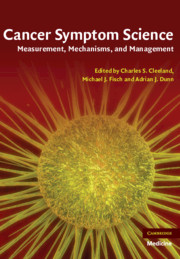Book contents
- Frontmatter
- Contents
- Contributors
- Foreword
- Credits and acknowledgements
- Section 1 Introduction
- Section 2 Cancer Symptom Mechanisms and Models: Clinical and Basic Science
- Section 3 Clinical Perspectives In Symptom Management and Research
- 20 Promoting symptom research in cooperative groups
- 21 Practical aspects of symptom management in patients with cancer
- 22 The economics of cancer-related symptoms: valuing supportive-care interventions
- Section 4 Symptom Measurement
- Section 5 Government and Industry Perspectives
- Section 6 Conclusion
- Index
- Plate section
- References
20 - Promoting symptom research in cooperative groups
from Section 3 - Clinical Perspectives In Symptom Management and Research
Published online by Cambridge University Press: 05 August 2011
- Frontmatter
- Contents
- Contributors
- Foreword
- Credits and acknowledgements
- Section 1 Introduction
- Section 2 Cancer Symptom Mechanisms and Models: Clinical and Basic Science
- Section 3 Clinical Perspectives In Symptom Management and Research
- 20 Promoting symptom research in cooperative groups
- 21 Practical aspects of symptom management in patients with cancer
- 22 The economics of cancer-related symptoms: valuing supportive-care interventions
- Section 4 Symptom Measurement
- Section 5 Government and Industry Perspectives
- Section 6 Conclusion
- Index
- Plate section
- References
Summary
Established in the 1950s, the oncology cooperative group system is a national clinical trials network supported by the National Cancer Institute (NCI) as part of its National Cancer Program. Membership is composed of public and private institutions, and includes researchers, physicians, and health care professionals. This clinical-trials network is responsible for conducting hundreds of clinical trials each year for the treatment and prevention of all types of cancer, and in the area of cancer symptom management. Since its development in 1983, the NCI-funded Community Clinical Oncology Program links community cancer specialists, primary care physicians, and health care providers to oncology cooperative groups and academic cancer centers. The portfolio of research conducted in the Community Clinical Oncology Program has broadened to include symptom management and quality of life research. The relatively new discipline of symptom research is becoming an increasingly important research focus within the cooperative group system.
In this chapter we summarize key accomplishments of the cooperative groups that have cancer-control research-base funding. Factors that have facilitated the successful conduct of symptom research are described, including cooperative group organizational factors, member institution characteristics, and characteristics associated with research protocols.
Overview of the cooperative group system
The NCI-funded groups responsible for developing and implementing cancer prevention and control clinical trials are called Research Bases. The oncology cooperative group system includes eight Research Bases with NCI-funded cancer-control research (Table 20.1). Each of these cooperative groups leads a research program that includes cancer control and prevention research, and cancer symptom management trials.
- Type
- Chapter
- Information
- Cancer Symptom ScienceMeasurement, Mechanisms, and Management, pp. 237 - 246Publisher: Cambridge University PressPrint publication year: 2010



